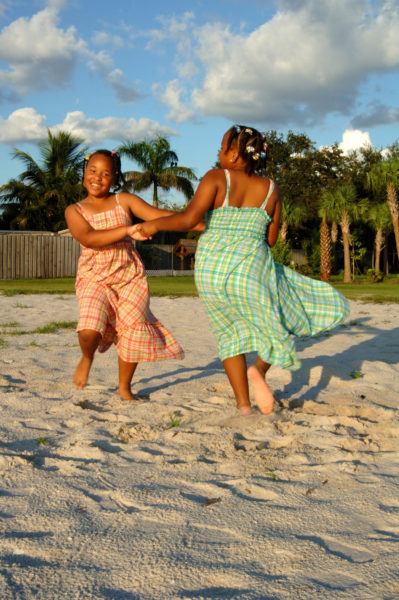Features
BN Prose: Born To Love, Taught To Hate by Kiki Nelson
 “Mommy, mommy, guess what?” The little girl turned excited eyes on her mother.
“Mommy, mommy, guess what?” The little girl turned excited eyes on her mother.
“What Tobi? First of all, why are your socks so dirty today?”
“That’s what I’m trying to tell you mommy, I made a new friend at school today, and we played together throughout recess. She’s my first friend at this new school and she lives in our estate too.” Five-year old Tobi continued chattering happily to her mom about her day’s activities. “She has a dog named Max and she says I can come play with him whenever I want. I like her,” the girl finished with a flourish.
“Really?” Her mother replied with amused curiosity. “And what is her name? I hope you remembered to ask that too.”
“Of course mommy,” the little girl giggled, slapping her mother’s thigh lightly. “Her name is Chinenye and she turns five next week.”
The woman paused from checking the contents of her daughter’s school bag. “Erm, Tobi, this your friend; I don’t know. Be careful about how close you get to her; you know we’ve talked about how important it is to be sure where people come from. You have other friends like Daramola, Adunola, who your dad and I know. Don’t be in a hurry to make friends with this girl at school just yet okay? At least, not until your dad and I give our ok.
The little girl’s brows furrowed in confusion. “But mom, I don’t know Adunola, neither do you or dad; she only came by with her mom yesterday to say hello because we just moved in. You even said they seemed stuck up; how then are we friends?”
“Tobi, don’t you argue with your mother! Now, you go up and take a shower, and we can revisit this topic later.”
The sulking child strolled up the stairs.
***
The table was all set. Everyone was excited and expectant, the frenzy mounting layer upon layer since the wee hours of the morning in the Ikemka household. Chief Ikemka’s first daughter was bringing home a man, and the occasion called for nothing less than a grand dinner party in typical Ikemka style. An Italian chef who was also trained in Nigerian cooking had been contacted to handle the catering; several uniformed butlers lined the hallway, and a private top-notch DJ was on hand to provide entertainment. Adaora had begged her parents to keep it low-key, making a case that they wouldn’t want to overwhelm their guest whom they would be meeting for the first time. So, her father had opted for one Dom Perignon per person as opposed to two, and had also declined from inviting some of their close extended family, keeping it more nuclear save for a few.
For the past year, Adaora’s parents had hounded her about introducing a man to the family, they had even tried unsuccessfully to arrange several chance encounters with ‘eligible bachelors.’ She was twenty-six, and in their opinion, should have given them at least one grandchild. Her younger sister Oge, was already in her husband’s house; her mother never failed to remind her as though she couldn’t see for herself. So, when Adaora announced over dinner a fortnight ago, that she wanted them to meet someone, the glee and approval around the table was unanimous. They wanted details- who he was, who his parents were, where he was from, what he did for a living, even where he attended school. Ada wouldn’t give them any answers; she asked them to be patient until they met him; not because she wasn’t proud of her man, but because she was petrified of her family’s preconceived judgement.
And her fears were hardly baseless. As soon as she ushered Tunde into the mini ballroom, she felt her father’s stiffening, and smelt his instant displeasure all the way across. The rest of the room consisting of her mother, two brothers, younger sister and husband, an uncle and aunt, and an older cousin, was equally tense. Tunde wasn’t the kind of individual whose ethnic origin needed any introduction; his sheer blackness of skin tone coupled with certain demeanour, left no doubt as to his South-Western roots.
It was common knowledge in the Ikemka family, that as far as spouses went, one could only marry amongst one’s people, and certain tribes were especially unacceptable. So, Adaora was well aware of the mountain that loomed before her, and though her father’s menacing stare caused her to tremble in her stilettoes, she still managed to force down saliva and say, “Dad, please meet Akintunde Esho.”
The rest of the night went downhill from there.
***
Gunshots could be heard all over the city. Dunuguwa was a ticking bomb, a landmine. Man, woman, poultry and cattle ran amok about town; mothers calling out for children, fathers trying to salvage what meagre savings they had tucked away for days such as this; everyone leaving house and farm behind, running for safety, running for dear life.
They were coming; they had known this for weeks, save for when. The retaliation never stopped- each group taking turns in slaughtering the other- now it was the Muslims who raged through town, their whetted daggers striking swiftly anyone who remotely looked like they couldn’t recite any of the Salat. The blood of lives unlived tainting the earth, with faces fixed in eternal horror masks in mockery to Mother Earth the benevolent life-giver. And then when the massacre took its toll, the Christians would recoup and go for the kill. The cycle never ended.
As it never did for Abu and his neighbour Kamalu. The two men had raised families across from each other for decades yet they never spat out so much as a ‘good morning,’ and banned their families from doing so. To the one, the other was Christian and South-Eastern; to the other, the one was Muslim and North-Western. These characteristics signified one overriding element- stark distrust.
And so it was that on the morning when all hell was let loose in Dunuguwa, Kamalu threw his wife and three kids into their old Volkswagen, about to speed off into the wind as houses were coming undone, blowing up on every side. He had driven off when his last son began to scream from behind, pleading for his dad to stop and reverse.
“But I can’t, can’t you see what’s going on?”
But the boy’s screams wouldn’t let up and grudgingly, Kamalu quickly reversed to find Abu his neighbour trapped beneath rubble while his seven-year old son Murtala tried to pull him out with all the tears in his eyes. Kamalu was frozen for a moment, not sure how to respond to someone whose existence he’d never recognised. Quickly, he jumped out of the car and tried to help the boy pull his father out.
“Abu, give me your hand.”
“Get away from me!” Abu replied agitatedly.
“Abu give me your hand now!” Kamalu screamed; but the man stubbornly refused, and in an instant, a truckload of burning debris fell on him, as the eerie wail of the son resounded for miles. Kamalu immediately grabbed the boy, stuffed him into the car and sped off into the future.
***
Twenty years later, in an ample-sized post-graduate classroom at New York University, a white lecturer hands out term-papers before the class disperses.
“Would the following students wait to see me please? Tobi, Nonye, and Murtala.”
“Yes, you three,” she smiled when they gathered around her. “I found your submissions to be quite interesting, even though you didn’t exactly address the topic – Racism and its Contemporary Issues. You will find I still gave you all a pass however. What’s even more peculiar is that you three are of the same nationality and your references in the assignment hinge along the same lines of stark ethnic divides. I’m currently exploring new research topics for my doctorate, so you can imagine that this fascinates me, particularly yours Nonye, you spoke a lot about your mother’s experiences.”
“Yes, Miss Clark, my mom recently opened up to me about how her parents’ prejudices robbed her of the chance of a lifetime with the love of her life, and the rippling effects of infidelity it caused in the early years of her marriage to my dad,” Nonye replied.
Miss Clark nodded pensively. “And you Tobi, you mentioned you grew up disliking a certain ethnic group for no reason that made any logical sense.”
Tobi nodded in response.
The lecturer focused sympathetic eyes on Murtala. “”And yours was quite sad – “Pride over Life” – you captioned it.””
“Yes, Miss Clark,” Murtala answered. “We may not readily identify with racism, but we understand tribalism, and in our minds, they are not world’s apart.
Photo Credit: Dreamstime | Mary Katherine Wynn


























